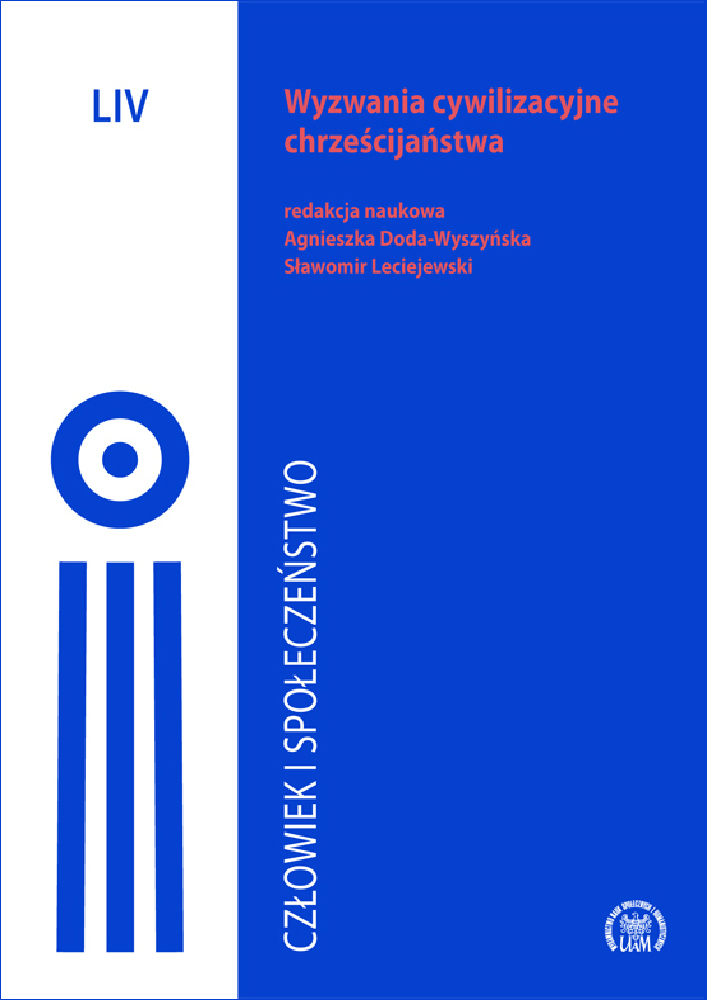Abstrakt
The main question that the article poses is whether today there is still a possibility of media debate, for example on religion or the Church; or perhaps the system of mass media is governed by the logic of what Niklas Luhmann calls the thematic career. Mass media discuss various topics, but probably do not help to search for solutions for intra- and intersystem conflicts. According to Luhmann, mass media, politics, science and religion are autopoietic systems; they develop by their own rules. They are sensitive to external conditions, but primarily refer to what they have developed within themselves. Drawing upon Niklas Luhmann’s systems theory and using the analysis of the old debate (around Galileo), still without participation of mass media, and the current debate from 2012 when Richard Dawkins met Cardinal George Pell, I ask a question about its current shape. This is presented against the backdrop of the problem of how much the so-called synodality of the Catholic Church helps a given religion influence other social systems (such as science) and generally – social life. Why is it so difficult to fulfil the conditions of debate in the context of the three systems: religion (based on the example of the Catholic religion), media (mainly the Internet) and science? Perhaps it is because we deal with extremely different social systems which are mostly concerned with their own internal development. Moreover, the situation of reflection on the phe- nomenon of religion and social systems always becomes complicated by a specific global situation, both in the Church (e.g. synodality), and outside it (e.g. pandemic, war, new social movements).
Bibliografia
Chmielewski, P. (2022). Papież Franciszek i mafia z Sankt Gallen. Kto stoi za rewolucją w Kościele Częstochowa: Wydawnictwo 3DOM.
Choczyńska, I. (2012). Chemiczne datowanie Całunu Turyńskiego. Wszechświat, 113(7–9). https://wszechswiat.ptpk.org/index.php/wszechswiat/article/view/545/416 (dostęp: 25.07.2022).
Dawkins, R. (2019). W: R. Dawkins, D.C. Dennett, S. Harris, Ch. Hitchens, Czterej jeźdźcy Apokalipsy. Jak zaczęła się ateistyczna rewolucja (ss. 13–14, 23–51, 69–171), tłum. P.J. Szwajcer. Stare Groszki: Wydawnictwo CiS.
Dennett, D.C. (2019). W: R. Dawkins, D.C. Dennett, S. Harris, Ch. Hitchens, Czterej jeźdźcy Apokalipsy. Jak zaczęła się ateistyczna rewolucja (ss. 13, 53–60, 69–171), tłum. P.J. Szwajcer. Stare Groszki: Wydawnictwo CiS.
Dogmat w Kościele katolickim. Co to jest i czemu służy? Do Rzeczy, 7.07.2022. https://dorzeczy.pl/religia/321799/dogmat-w-kosciele-katolickim-co-to-jest-i-czemu-sluzy.htmlfbclid=IwAR3Y8tqZ1CX9bnIawfTbkohdtzvUvn4jv0XPQVRa7jSR6T_cEn5K-g9yRI_M (dostęp: 25.07.2022).
Feyerabend, P.K. (2001). Przeciw metodzie, tłum. S. Wiertlewski. Wrocław: Siedmioróg. Harris, S. (2019). W: R. Dawkins, D.C. Dennett, S. Harris, Ch. Hitchens, Czterej jeźdźcy Apokalipsy. Jak zaczęła się ateistyczna rewolucja (ss. 61–65, 70–171), tłum. P.J. Szwajcer. Stare Groszki: Wydawnictwo CiS.
Hitchens, Ch. (2019). W: R. Dawkins, D.C. Dennett, S. Harris, Ch. Hitchens, Czterej jeźdźcy Apokalipsy. Jak zaczęła się ateistyczna rewolucja (ss. 12–14, 71–171), tłum. P.J. Szwajcer. Stare Groszki: Wydawnictwo CiS.
Jones, M.E. (2019). Rebelia. Kościół katolicki i kulturowa rewolucja, tłum. J. Przybył. Wrocław: Wydawnictwo Wektory.
Karczewski, S. (2020). Polowanie na kardynała. Warszawa: Veritatis Splendor. Kard. Arinze o synodzie: mamy słuchać Boga, a nie doradzać Jezusowi, ekai, https://www.ekai.pl/kard-arinze-o-synodzie-mamy-sluchac-boga-a-nie-doradzac-jezusowi/ (dostęp: 1.11.2022).
Kard. Pell debatował z Dawkinsem. Gość Niedzielny, 12.04.2012. https://www.gosc.pl/doc/1130172.Kard-Pell-debatowal-z-Dawkinsem (dostęp: 25.07.2022).
Kuhn, Th.S. (2001). Struktura rewolucji naukowych, tłum. H. Ostromęcka. Warszawa: Aletheia.
Lisicki, P. (2020). Dogmat i tiara. Esej o upadku rzymskiego katolicyzmu. Warszawa: Fronda PL.
Luhmann, N. (2007a). Funkcja religii, tłum. D. Motak. Kraków: Zakład Wydawniczy Nomos.
Luhmann, N. (2007b). Systemy społeczne, tłum. M. Kaczmarczyk. Kraków: Zakład Wydawniczy Nomos.
Luhmann, N. (2009). Realność mediów masowych, tłum. J. Barbacka. Wrocław: Wydaw- nictwo GAJT.
Oko, D. (2021). Lawendowa mafia. Z papieżami i biskupami przeciwko homoklikom w Kościele. Kraków: Wydawnictwo AA.
Rowiński, T. (2019). Ofensywa obyczajowa. W: Kościół po Sekielskim. „Bramy piekielne go nie przemogą”. Biblioteka PCH24.pl, e-book.
Licencja
Prawa autorskie (c) 2023 Agnieszka Doda-Wyszyńska

Utwór dostępny jest na licencji Creative Commons Uznanie autorstwa 4.0 Międzynarodowe.
1. W momencie złożenia pracy celem rozpoczęcia postępowania w sprawie publikacji, Licencjodawca, zwany dalej Autorem, akceptuje wszystkie zasady umieszczone na stronie internetowej czasopisma “Człowiek i Społeczeństwo”, udzielając Licencjobiorcy, zwanego dalej Wydawcą, niewyłącznej i nieodpłatnej licencji na korzystanie z Utworu. Licencja zakłada tym samym brak ograniczeń terytorialnych, czasowych oraz ilościowych na następujących polach eksploatacji (art. 50 ustawy z dnia 4 lutego 1994 r. o prawie autorskim i prawach pokrewnych):
a. utrwalanie Utworu;
b. zwielokrotnienie Utworu drukiem i w wersji cyfrowej;
c. wprowadzenie do obrotu, użyczenie lub najem oryginału/zwielokrotnionych egzemplarzy Utworu;
d. publiczne wykonanie, wystawienie, wyświetlenie, odtworzenie oraz nadawanie i reemitowanie, a także publiczne udostępnianie Utworu w taki sposób, aby każdy mógł mieć do niego dostęp w miejscu i w czasie przez siebie wybranym;
e. włączenie Utworu w skład utworu zbiorowego;
f. wprowadzenie Utworu w postaci elektronicznej na platformy elektroniczne lub inne wprowadzenie Utworu w postaci elektronicznej do Internetu, Intranetu, Extranetu lub innej sieci;
g. rozpowszechnianie Utworu w wersji elektronicznej w Internecie, Intranecie, Extranecie lub innej sieci, w pracy zbiorowej, a także samodzielnie w formule Open Access w oparciu o licencję Creative Commons Uznanie autorstwa 4.0 Międzynarodowa Licencja Publiczna (CC BY 4.0), a także inną wersję językową tej licencji, lub którąkolwiek późniejszą wersję tej licencji.
2. Założenia licencji Creative Commons Uznanie autorstwa 4.0 Międzynarodowa Licencja Publiczna (CC BY 4.0), udzielają Wydawcy upoważnienia do kopiowania, zmieniania, rozprowadzania, przedstawiania i wykonywania Utworu jedynie pod warunkiem uznania autorstwa.
3. Wraz z dostarczeniem Utworu, Autor zobowiązuje się do wypełnienia, podpisania oraz odesłania skanu umowy

